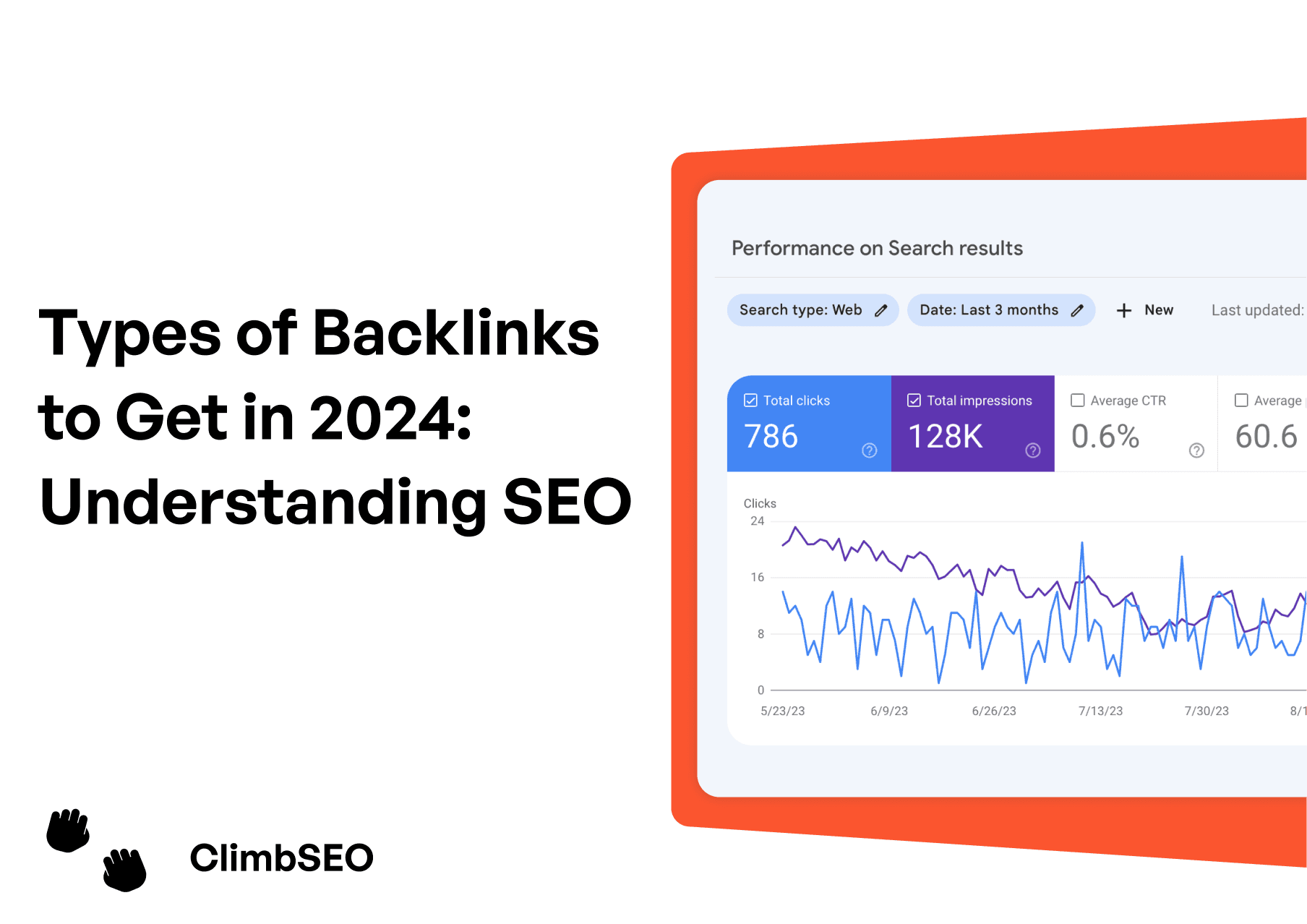22 Oct 2024
Can You Get Banned From Google?
Can You Get Banned From Google?
Can You Get Banned From Google?
Can You Get Banned From Google?
Can you get banned from Google? Discover why it happens, what to do if your account has been disabled, and learn tips to protect your account from penalties.
Can you get banned from Google? Discover why it happens, what to do if your account has been disabled, and learn tips to protect your account from penalties.
Can you get banned from Google? Discover why it happens, what to do if your account has been disabled, and learn tips to protect your account from penalties.
Can you get banned from Google? Discover why it happens, what to do if your account has been disabled, and learn tips to protect your account from penalties.

Finley Cope
Finley Cope
Finley Cope
Finley Cope
If you’re a website owner, digital marketer or SEO enthusiast the idea of being banned from Google is a nightmare. Google is the lifeblood of organic traffic and losing your site’s visibility in search results could be a disaster for your business or personal online presence. But can you get banned from Google? The short answer is yes but it’s usually because you’ve violated Google’s policies.
In this in-depth guide we’ll go into the different ways you can get banned from Google, the common reasons for account suspension or banning and give you a roadmap to avoid getting banned. If you’re new to SEO or just curious about the dos and don’ts when it comes to your Google account and SEO efforts this guide is for you.
Can You Get Banned from Google?
Yes, you can get banned from Google. Google can ban your website from their search engine results if you violate certain guidelines, mainly the Search Essential Guidelines (formally webmaster guidelines). Google can also disable your Google account if they suspect malicious activity or you break their terms of service.
When we talk about getting “banned from Google” we mean two things:
Website Banning: When your website gets penalized or de-indexed from Google Search and becomes invisible to users searching for it.
Google Account Suspension: When your personal or business Google account gets disabled due to suspicious activity or policy violations.
Let’s start by diving into how you can get banned from Google Search and why it happens.
Getting Banned from the Google Search Engine
When your website is banned from Google Search, it means Google has either penalized or removed your site from the index. This can happen for many reasons, usually related to bad SEO or going against Google’s guidelines.
Types of Google Bans
Manual Penalty: Google’s team manually reviews your site and penalties if they find severe violations. This can be demoting your rankings to removing your site from search results altogether.
Algorithmic Penalty: Google’s algorithms (Panda, Penguin, Fred etc) will penalize your site if it’s using spammy SEO techniques. These penalties happen without human intervention.
Complete De-Indexing: This is the worst penalty, where your website is removed from Google’s index completely. This happens if Google finds your site cloaking, creating doorway pages or running a network of link farms.
It’s bad because most websites live on organic traffic. If you’re penalized, it will take time and effort to recover.
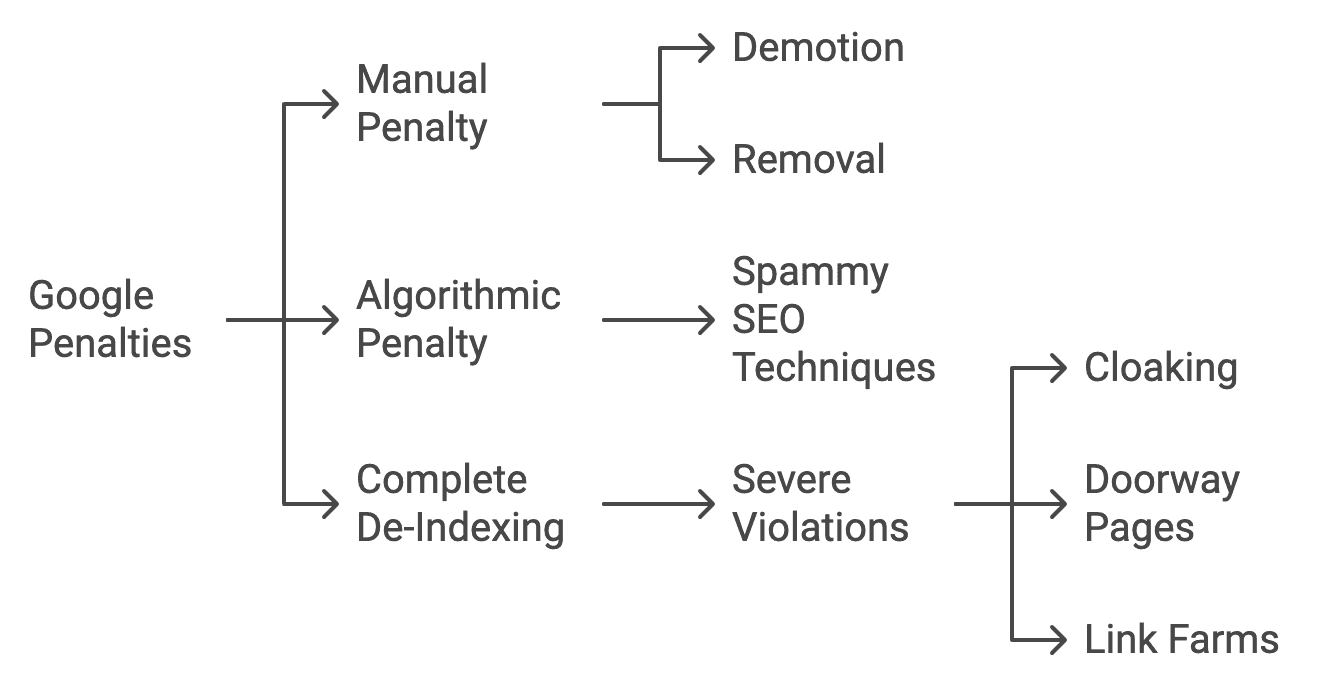
Common Reasons for Getting Banned
Here are the common reasons why your website gets banned from Google. Most of these are black hat SEO practices. Here are the most common:
Cloaking:
Showing one page to search engines and a completely different page to users. Google penalizes this because it tricks its algorithm into thinking your content is more relevant than it is.
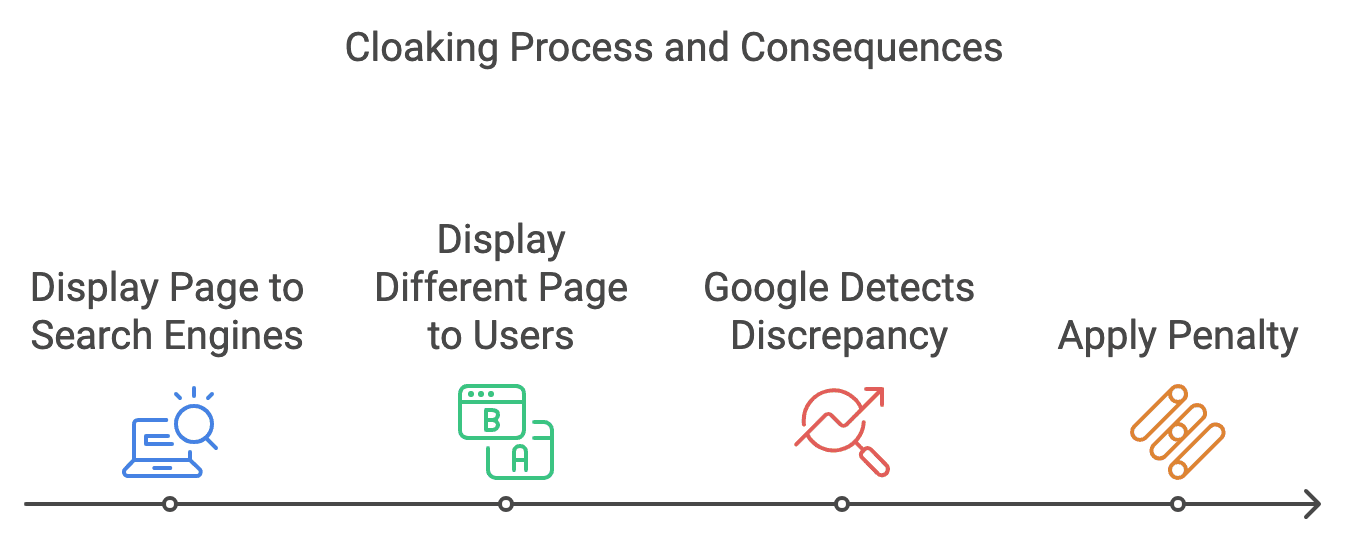
Plagiarism:
Google doesn’t like content duplication. Copying content from other websites can get you penalised because it reduces the value of unique content.
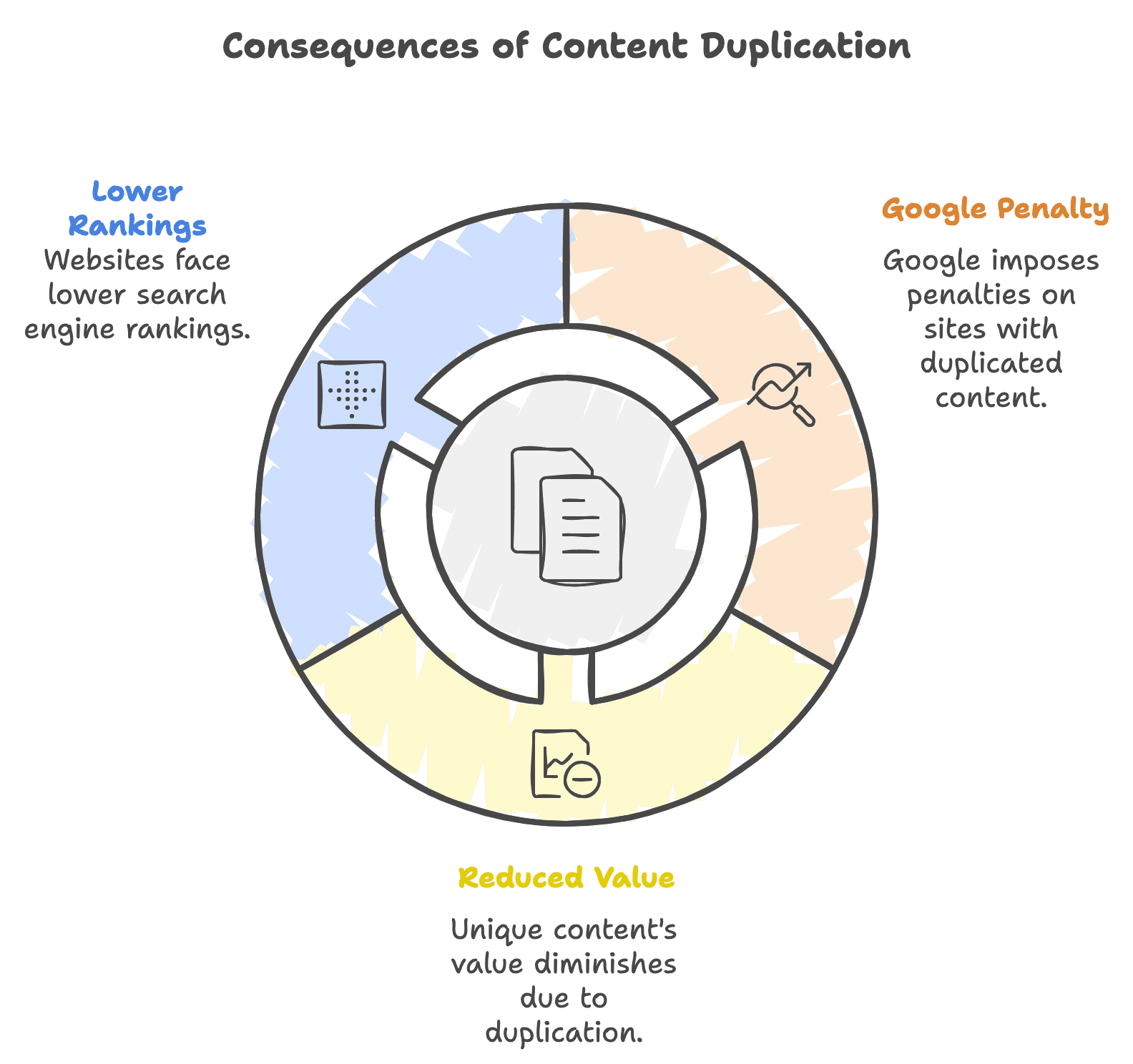
Keyword Stuffing:
Overloading your content with too many instances of the same keyword to manipulate search engine rankings. Google’s algorithm is smart enough to detect this and it’s a sure way to get penalised.
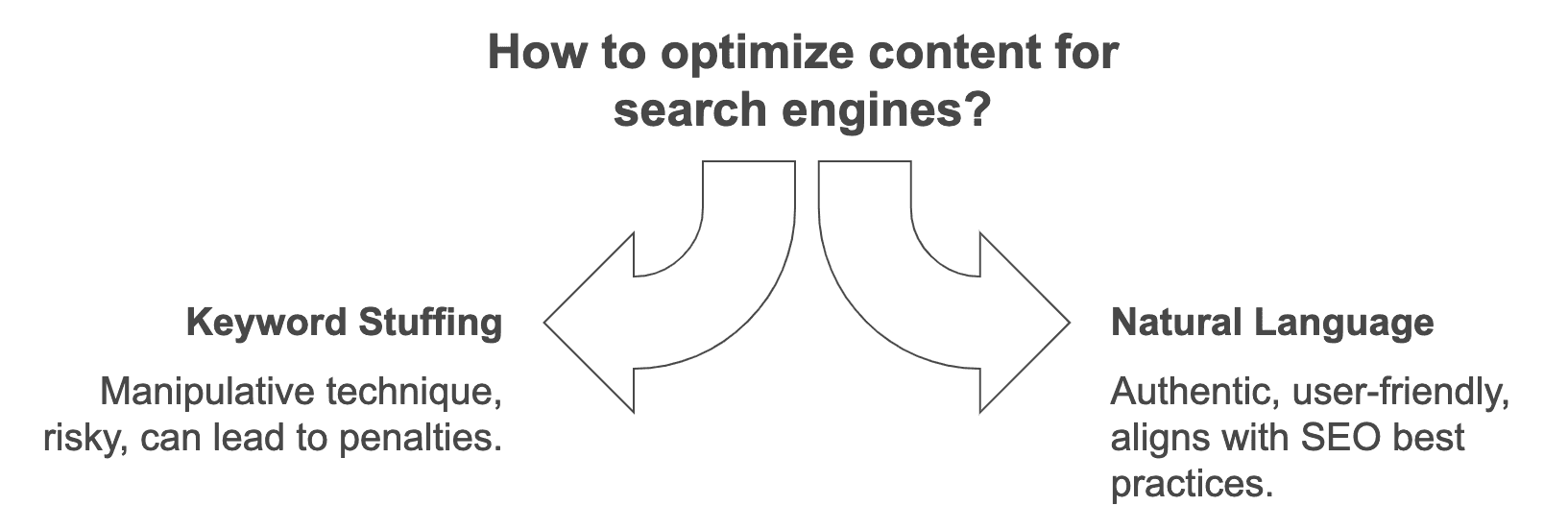
Hidden Text and Links:
Hiding text or links within your webpage’s HTML that is invisible to users but detectable by search engines is another form of deception that Google penalises.

Spammy Backlinks:
Getting unnatural or low quality backlinks from shady sources to manipulate Google’s ranking system can get you penalised or banned.
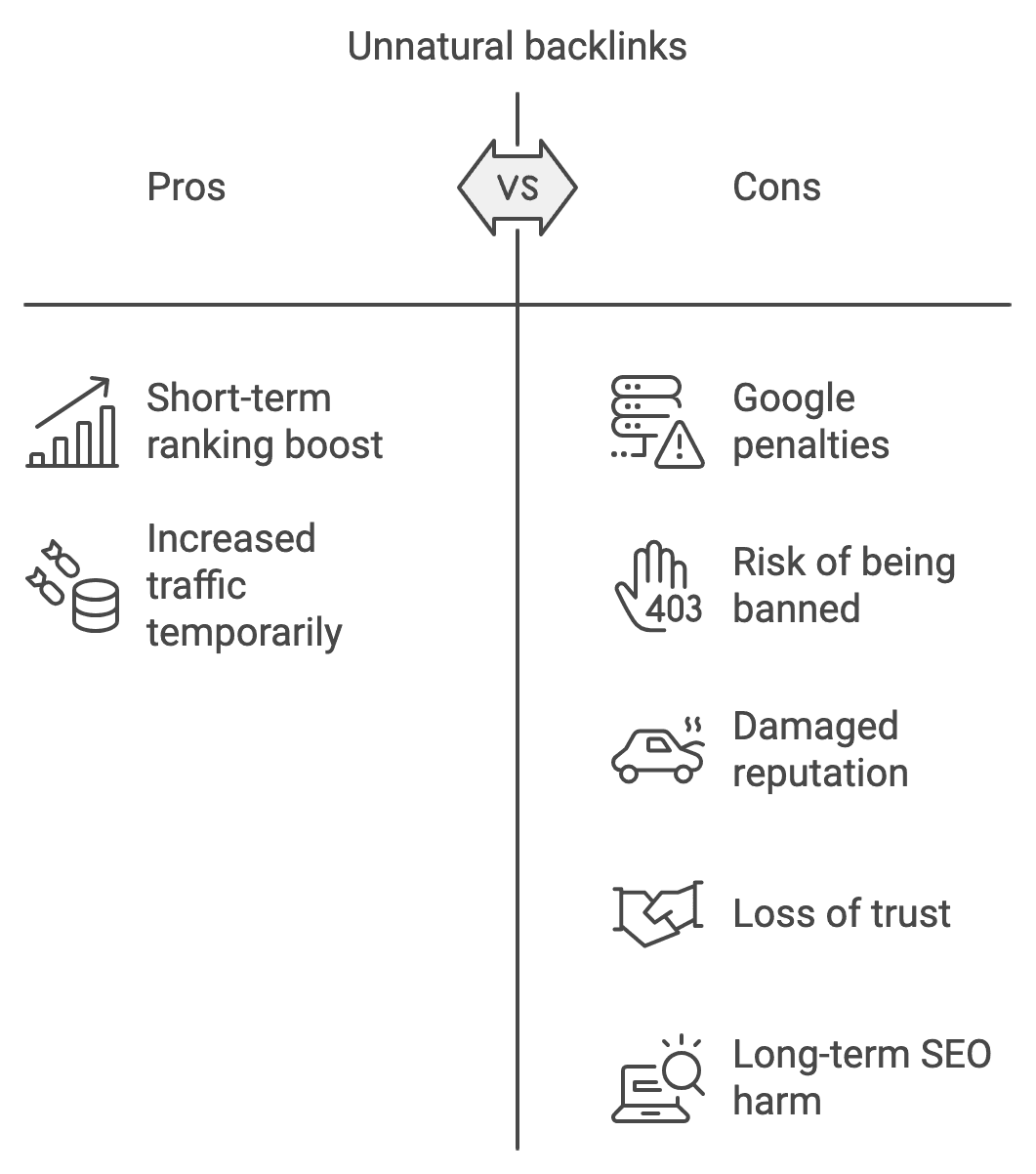
Doorway Pages:
These are low quality pages created to rank for specific keywords and then funnel users to another part of your site. Doorway pages provide no value and are seen as manipulative.

How Do You Know if Google Banned You?
So, how do you know if your site has been banned from Google or your Google account has been disabled? Here are the signs to look out for:
Sudden Drop in Organic Traffic: If you see a big or sudden drop in your site’s organic traffic, especially from Google, something is up. Use Google Analytics or Google Search Console to track your traffic trends.
Not Showing in Search Results: If your site is not showing up in search results for any query, even when you search for your domain name directly, you’ve probably been banned or penalized.
Google Search Console Warning: Google Search Console will notify you if your site has been manually penalized. You can see the reasons and take action.
Email Notification: If your Google account is disabled, you’ll get an email explaining why your account was suspended or banned.

Avoid Getting Banned from Google
Prevention is the best cure when it comes to avoiding a Google ban. Follow best practices and Google’s guidelines and you’ll reduce your chances of getting penalised or banned. Here are the key things to do to keep your site in good standing with Google.
Follow Google’s Search Essential Guidelines: Google has Webmaster Guidelines to help website owners keep good relationship with the search engine. Make sure you know these rules and follow them.
Create High Quality, Original Content: All content on your site must be original, valuable and provide real insights to your audience. Don’t copy or spin content from others.
Build Natural Backlinks: Focus on getting backlinks from authority sites in your niche, not black hat SEO techniques like buying links or participating in link schemes.
Use Keywords Naturally: Instead of keyword stuffing, use primary and secondary keywords naturally in your content. Make sure your content provides real value and answers users questions effectively.
Regularly Audit Your Site: Regular SEO audits will help you identify issues like broken links, duplicate content or slow page speed. Fix these issues asap and you’ll avoid penalties.
Avoid Spammy Ads: Overloading your site with ads, especially intrusive pop-ups will degrade user experience and get you penalised. Make sure your ads comply with Google’s ad guidelines.
What Happens When Your Account Is Disabled?
Google accounts are typically disabled when there is suspicious activity or a violation of Google’s policies. This can happen for a number of reasons, including spamming, violating Google’s terms of service, or malicious behavior.
If your account is disabled, you’ll receive an email notification explaining why it was suspended. In some cases, you may be able to appeal the suspension, but it’s crucial to understand the cause first.
Common Reasons for Google Account Suspension
Violation of Google’s Terms of Service: This could include things like attempting to manipulate Google Ads or engaging in malicious behavior.
Suspicious Activity: If Google detects suspicious activity on your account, such as logging in from multiple IP addresses in a short period of time, it may temporarily disable your account.
Spamming or Abusive Behavior: If your account is used to send spammy messages or engage in abusive behavior, Google may ban it.
How to Recover a Disabled Google Account
So your Google account is disabled? First you need to know why. Google will usually tell you via email or when you try to log in. Once you know why, you can start the recovery process.
Read the Violation:
Google will explain why your account was disabled. Make sure you read this thoroughly.
Appeal:
If you think your account was disabled in error, you can appeal. Follow the instructions in the email or on the sign in page to appeal.
Wait for Google’s Response:
After you appeal, it may take a few days or weeks for Google to get back to you. Don’t create a new account while waiting as this will delay the process.
Fix the Issue:
If the ban was due to something in your control, like violating terms of service, make sure you fix the issue before you appeal.
SEO Best Practices to Avoid Getting Banned
The best way to avoid being banned from Google is to follow SEO best practices that align with Google’s expectations for high-quality websites. Below are some tried-and-true practices that will help you stay in Google’s good graces.
Understand Google’s (Search Essentials) Webmaster Guidelines:
Familiarise yourself with Google’s Webmaster Guidelines and ensure your website complies with them.
Regularly Audit Your Site:
Perform regular SEO audits to ensure your site doesn’t have any major issues, like broken links, duplicate content, or slow loading speeds.
Create High-Quality, Original Content:
Publish content that provides value to your users and is unique. Avoid using spun or plagiarized content.
Build a Natural Link Profile:
Focus on earning quality backlinks from authoritative sites, rather than buying links or engaging in link farms.
Use SEO Best Practices:
Avoid black hat SEO techniques like cloaking, keyword stuffing, and using doorway pages. Focus on white hat SEO strategies that prioritize user experience and relevance.
Summary
Yes, you can get banned from Google, but it's entirely preventable if you follow Google’s guidelines, focus on creating high-quality content, and avoid using black hat SEO techniques. Whether you’re managing a website or just trying to maintain a Google account, staying informed and proactive is the best way to avoid penalties or account suspension. By adhering to best practices and focusing on delivering real value to your audience, you can keep your website and Google account in good standing.
By understanding the reasons for bans and how to avoid them, you'll be well-equipped to navigate Google’s complex ecosystem and maintain your visibility in search results.
Other knowledge you might be interested in
If you’re a website owner, digital marketer or SEO enthusiast the idea of being banned from Google is a nightmare. Google is the lifeblood of organic traffic and losing your site’s visibility in search results could be a disaster for your business or personal online presence. But can you get banned from Google? The short answer is yes but it’s usually because you’ve violated Google’s policies.
In this in-depth guide we’ll go into the different ways you can get banned from Google, the common reasons for account suspension or banning and give you a roadmap to avoid getting banned. If you’re new to SEO or just curious about the dos and don’ts when it comes to your Google account and SEO efforts this guide is for you.
Can You Get Banned from Google?
Yes, you can get banned from Google. Google can ban your website from their search engine results if you violate certain guidelines, mainly the Search Essential Guidelines (formally webmaster guidelines). Google can also disable your Google account if they suspect malicious activity or you break their terms of service.
When we talk about getting “banned from Google” we mean two things:
Website Banning: When your website gets penalized or de-indexed from Google Search and becomes invisible to users searching for it.
Google Account Suspension: When your personal or business Google account gets disabled due to suspicious activity or policy violations.
Let’s start by diving into how you can get banned from Google Search and why it happens.
Getting Banned from the Google Search Engine
When your website is banned from Google Search, it means Google has either penalized or removed your site from the index. This can happen for many reasons, usually related to bad SEO or going against Google’s guidelines.
Types of Google Bans
Manual Penalty: Google’s team manually reviews your site and penalties if they find severe violations. This can be demoting your rankings to removing your site from search results altogether.
Algorithmic Penalty: Google’s algorithms (Panda, Penguin, Fred etc) will penalize your site if it’s using spammy SEO techniques. These penalties happen without human intervention.
Complete De-Indexing: This is the worst penalty, where your website is removed from Google’s index completely. This happens if Google finds your site cloaking, creating doorway pages or running a network of link farms.
It’s bad because most websites live on organic traffic. If you’re penalized, it will take time and effort to recover.

Common Reasons for Getting Banned
Here are the common reasons why your website gets banned from Google. Most of these are black hat SEO practices. Here are the most common:
Cloaking:
Showing one page to search engines and a completely different page to users. Google penalizes this because it tricks its algorithm into thinking your content is more relevant than it is.

Plagiarism:
Google doesn’t like content duplication. Copying content from other websites can get you penalised because it reduces the value of unique content.

Keyword Stuffing:
Overloading your content with too many instances of the same keyword to manipulate search engine rankings. Google’s algorithm is smart enough to detect this and it’s a sure way to get penalised.

Hidden Text and Links:
Hiding text or links within your webpage’s HTML that is invisible to users but detectable by search engines is another form of deception that Google penalises.

Spammy Backlinks:
Getting unnatural or low quality backlinks from shady sources to manipulate Google’s ranking system can get you penalised or banned.

Doorway Pages:
These are low quality pages created to rank for specific keywords and then funnel users to another part of your site. Doorway pages provide no value and are seen as manipulative.

How Do You Know if Google Banned You?
So, how do you know if your site has been banned from Google or your Google account has been disabled? Here are the signs to look out for:
Sudden Drop in Organic Traffic: If you see a big or sudden drop in your site’s organic traffic, especially from Google, something is up. Use Google Analytics or Google Search Console to track your traffic trends.
Not Showing in Search Results: If your site is not showing up in search results for any query, even when you search for your domain name directly, you’ve probably been banned or penalized.
Google Search Console Warning: Google Search Console will notify you if your site has been manually penalized. You can see the reasons and take action.
Email Notification: If your Google account is disabled, you’ll get an email explaining why your account was suspended or banned.

Avoid Getting Banned from Google
Prevention is the best cure when it comes to avoiding a Google ban. Follow best practices and Google’s guidelines and you’ll reduce your chances of getting penalised or banned. Here are the key things to do to keep your site in good standing with Google.
Follow Google’s Search Essential Guidelines: Google has Webmaster Guidelines to help website owners keep good relationship with the search engine. Make sure you know these rules and follow them.
Create High Quality, Original Content: All content on your site must be original, valuable and provide real insights to your audience. Don’t copy or spin content from others.
Build Natural Backlinks: Focus on getting backlinks from authority sites in your niche, not black hat SEO techniques like buying links or participating in link schemes.
Use Keywords Naturally: Instead of keyword stuffing, use primary and secondary keywords naturally in your content. Make sure your content provides real value and answers users questions effectively.
Regularly Audit Your Site: Regular SEO audits will help you identify issues like broken links, duplicate content or slow page speed. Fix these issues asap and you’ll avoid penalties.
Avoid Spammy Ads: Overloading your site with ads, especially intrusive pop-ups will degrade user experience and get you penalised. Make sure your ads comply with Google’s ad guidelines.
What Happens When Your Account Is Disabled?
Google accounts are typically disabled when there is suspicious activity or a violation of Google’s policies. This can happen for a number of reasons, including spamming, violating Google’s terms of service, or malicious behavior.
If your account is disabled, you’ll receive an email notification explaining why it was suspended. In some cases, you may be able to appeal the suspension, but it’s crucial to understand the cause first.
Common Reasons for Google Account Suspension
Violation of Google’s Terms of Service: This could include things like attempting to manipulate Google Ads or engaging in malicious behavior.
Suspicious Activity: If Google detects suspicious activity on your account, such as logging in from multiple IP addresses in a short period of time, it may temporarily disable your account.
Spamming or Abusive Behavior: If your account is used to send spammy messages or engage in abusive behavior, Google may ban it.
How to Recover a Disabled Google Account
So your Google account is disabled? First you need to know why. Google will usually tell you via email or when you try to log in. Once you know why, you can start the recovery process.
Read the Violation:
Google will explain why your account was disabled. Make sure you read this thoroughly.
Appeal:
If you think your account was disabled in error, you can appeal. Follow the instructions in the email or on the sign in page to appeal.
Wait for Google’s Response:
After you appeal, it may take a few days or weeks for Google to get back to you. Don’t create a new account while waiting as this will delay the process.
Fix the Issue:
If the ban was due to something in your control, like violating terms of service, make sure you fix the issue before you appeal.
SEO Best Practices to Avoid Getting Banned
The best way to avoid being banned from Google is to follow SEO best practices that align with Google’s expectations for high-quality websites. Below are some tried-and-true practices that will help you stay in Google’s good graces.
Understand Google’s (Search Essentials) Webmaster Guidelines:
Familiarise yourself with Google’s Webmaster Guidelines and ensure your website complies with them.
Regularly Audit Your Site:
Perform regular SEO audits to ensure your site doesn’t have any major issues, like broken links, duplicate content, or slow loading speeds.
Create High-Quality, Original Content:
Publish content that provides value to your users and is unique. Avoid using spun or plagiarized content.
Build a Natural Link Profile:
Focus on earning quality backlinks from authoritative sites, rather than buying links or engaging in link farms.
Use SEO Best Practices:
Avoid black hat SEO techniques like cloaking, keyword stuffing, and using doorway pages. Focus on white hat SEO strategies that prioritize user experience and relevance.
Summary
Yes, you can get banned from Google, but it's entirely preventable if you follow Google’s guidelines, focus on creating high-quality content, and avoid using black hat SEO techniques. Whether you’re managing a website or just trying to maintain a Google account, staying informed and proactive is the best way to avoid penalties or account suspension. By adhering to best practices and focusing on delivering real value to your audience, you can keep your website and Google account in good standing.
By understanding the reasons for bans and how to avoid them, you'll be well-equipped to navigate Google’s complex ecosystem and maintain your visibility in search results.
Other knowledge you might be interested in
If you’re a website owner, digital marketer or SEO enthusiast the idea of being banned from Google is a nightmare. Google is the lifeblood of organic traffic and losing your site’s visibility in search results could be a disaster for your business or personal online presence. But can you get banned from Google? The short answer is yes but it’s usually because you’ve violated Google’s policies.
In this in-depth guide we’ll go into the different ways you can get banned from Google, the common reasons for account suspension or banning and give you a roadmap to avoid getting banned. If you’re new to SEO or just curious about the dos and don’ts when it comes to your Google account and SEO efforts this guide is for you.
Can You Get Banned from Google?
Yes, you can get banned from Google. Google can ban your website from their search engine results if you violate certain guidelines, mainly the Search Essential Guidelines (formally webmaster guidelines). Google can also disable your Google account if they suspect malicious activity or you break their terms of service.
When we talk about getting “banned from Google” we mean two things:
Website Banning: When your website gets penalized or de-indexed from Google Search and becomes invisible to users searching for it.
Google Account Suspension: When your personal or business Google account gets disabled due to suspicious activity or policy violations.
Let’s start by diving into how you can get banned from Google Search and why it happens.
Getting Banned from the Google Search Engine
When your website is banned from Google Search, it means Google has either penalized or removed your site from the index. This can happen for many reasons, usually related to bad SEO or going against Google’s guidelines.
Types of Google Bans
Manual Penalty: Google’s team manually reviews your site and penalties if they find severe violations. This can be demoting your rankings to removing your site from search results altogether.
Algorithmic Penalty: Google’s algorithms (Panda, Penguin, Fred etc) will penalize your site if it’s using spammy SEO techniques. These penalties happen without human intervention.
Complete De-Indexing: This is the worst penalty, where your website is removed from Google’s index completely. This happens if Google finds your site cloaking, creating doorway pages or running a network of link farms.
It’s bad because most websites live on organic traffic. If you’re penalized, it will take time and effort to recover.

Common Reasons for Getting Banned
Here are the common reasons why your website gets banned from Google. Most of these are black hat SEO practices. Here are the most common:
Cloaking:
Showing one page to search engines and a completely different page to users. Google penalizes this because it tricks its algorithm into thinking your content is more relevant than it is.

Plagiarism:
Google doesn’t like content duplication. Copying content from other websites can get you penalised because it reduces the value of unique content.

Keyword Stuffing:
Overloading your content with too many instances of the same keyword to manipulate search engine rankings. Google’s algorithm is smart enough to detect this and it’s a sure way to get penalised.

Hidden Text and Links:
Hiding text or links within your webpage’s HTML that is invisible to users but detectable by search engines is another form of deception that Google penalises.

Spammy Backlinks:
Getting unnatural or low quality backlinks from shady sources to manipulate Google’s ranking system can get you penalised or banned.

Doorway Pages:
These are low quality pages created to rank for specific keywords and then funnel users to another part of your site. Doorway pages provide no value and are seen as manipulative.

How Do You Know if Google Banned You?
So, how do you know if your site has been banned from Google or your Google account has been disabled? Here are the signs to look out for:
Sudden Drop in Organic Traffic: If you see a big or sudden drop in your site’s organic traffic, especially from Google, something is up. Use Google Analytics or Google Search Console to track your traffic trends.
Not Showing in Search Results: If your site is not showing up in search results for any query, even when you search for your domain name directly, you’ve probably been banned or penalized.
Google Search Console Warning: Google Search Console will notify you if your site has been manually penalized. You can see the reasons and take action.
Email Notification: If your Google account is disabled, you’ll get an email explaining why your account was suspended or banned.

Avoid Getting Banned from Google
Prevention is the best cure when it comes to avoiding a Google ban. Follow best practices and Google’s guidelines and you’ll reduce your chances of getting penalised or banned. Here are the key things to do to keep your site in good standing with Google.
Follow Google’s Search Essential Guidelines: Google has Webmaster Guidelines to help website owners keep good relationship with the search engine. Make sure you know these rules and follow them.
Create High Quality, Original Content: All content on your site must be original, valuable and provide real insights to your audience. Don’t copy or spin content from others.
Build Natural Backlinks: Focus on getting backlinks from authority sites in your niche, not black hat SEO techniques like buying links or participating in link schemes.
Use Keywords Naturally: Instead of keyword stuffing, use primary and secondary keywords naturally in your content. Make sure your content provides real value and answers users questions effectively.
Regularly Audit Your Site: Regular SEO audits will help you identify issues like broken links, duplicate content or slow page speed. Fix these issues asap and you’ll avoid penalties.
Avoid Spammy Ads: Overloading your site with ads, especially intrusive pop-ups will degrade user experience and get you penalised. Make sure your ads comply with Google’s ad guidelines.
What Happens When Your Account Is Disabled?
Google accounts are typically disabled when there is suspicious activity or a violation of Google’s policies. This can happen for a number of reasons, including spamming, violating Google’s terms of service, or malicious behavior.
If your account is disabled, you’ll receive an email notification explaining why it was suspended. In some cases, you may be able to appeal the suspension, but it’s crucial to understand the cause first.
Common Reasons for Google Account Suspension
Violation of Google’s Terms of Service: This could include things like attempting to manipulate Google Ads or engaging in malicious behavior.
Suspicious Activity: If Google detects suspicious activity on your account, such as logging in from multiple IP addresses in a short period of time, it may temporarily disable your account.
Spamming or Abusive Behavior: If your account is used to send spammy messages or engage in abusive behavior, Google may ban it.
How to Recover a Disabled Google Account
So your Google account is disabled? First you need to know why. Google will usually tell you via email or when you try to log in. Once you know why, you can start the recovery process.
Read the Violation:
Google will explain why your account was disabled. Make sure you read this thoroughly.
Appeal:
If you think your account was disabled in error, you can appeal. Follow the instructions in the email or on the sign in page to appeal.
Wait for Google’s Response:
After you appeal, it may take a few days or weeks for Google to get back to you. Don’t create a new account while waiting as this will delay the process.
Fix the Issue:
If the ban was due to something in your control, like violating terms of service, make sure you fix the issue before you appeal.
SEO Best Practices to Avoid Getting Banned
The best way to avoid being banned from Google is to follow SEO best practices that align with Google’s expectations for high-quality websites. Below are some tried-and-true practices that will help you stay in Google’s good graces.
Understand Google’s (Search Essentials) Webmaster Guidelines:
Familiarise yourself with Google’s Webmaster Guidelines and ensure your website complies with them.
Regularly Audit Your Site:
Perform regular SEO audits to ensure your site doesn’t have any major issues, like broken links, duplicate content, or slow loading speeds.
Create High-Quality, Original Content:
Publish content that provides value to your users and is unique. Avoid using spun or plagiarized content.
Build a Natural Link Profile:
Focus on earning quality backlinks from authoritative sites, rather than buying links or engaging in link farms.
Use SEO Best Practices:
Avoid black hat SEO techniques like cloaking, keyword stuffing, and using doorway pages. Focus on white hat SEO strategies that prioritize user experience and relevance.
Summary
Yes, you can get banned from Google, but it's entirely preventable if you follow Google’s guidelines, focus on creating high-quality content, and avoid using black hat SEO techniques. Whether you’re managing a website or just trying to maintain a Google account, staying informed and proactive is the best way to avoid penalties or account suspension. By adhering to best practices and focusing on delivering real value to your audience, you can keep your website and Google account in good standing.
By understanding the reasons for bans and how to avoid them, you'll be well-equipped to navigate Google’s complex ecosystem and maintain your visibility in search results.
Other knowledge you might be interested in
If you’re a website owner, digital marketer or SEO enthusiast the idea of being banned from Google is a nightmare. Google is the lifeblood of organic traffic and losing your site’s visibility in search results could be a disaster for your business or personal online presence. But can you get banned from Google? The short answer is yes but it’s usually because you’ve violated Google’s policies.
In this in-depth guide we’ll go into the different ways you can get banned from Google, the common reasons for account suspension or banning and give you a roadmap to avoid getting banned. If you’re new to SEO or just curious about the dos and don’ts when it comes to your Google account and SEO efforts this guide is for you.
Can You Get Banned from Google?
Yes, you can get banned from Google. Google can ban your website from their search engine results if you violate certain guidelines, mainly the Search Essential Guidelines (formally webmaster guidelines). Google can also disable your Google account if they suspect malicious activity or you break their terms of service.
When we talk about getting “banned from Google” we mean two things:
Website Banning: When your website gets penalized or de-indexed from Google Search and becomes invisible to users searching for it.
Google Account Suspension: When your personal or business Google account gets disabled due to suspicious activity or policy violations.
Let’s start by diving into how you can get banned from Google Search and why it happens.
Getting Banned from the Google Search Engine
When your website is banned from Google Search, it means Google has either penalized or removed your site from the index. This can happen for many reasons, usually related to bad SEO or going against Google’s guidelines.
Types of Google Bans
Manual Penalty: Google’s team manually reviews your site and penalties if they find severe violations. This can be demoting your rankings to removing your site from search results altogether.
Algorithmic Penalty: Google’s algorithms (Panda, Penguin, Fred etc) will penalize your site if it’s using spammy SEO techniques. These penalties happen without human intervention.
Complete De-Indexing: This is the worst penalty, where your website is removed from Google’s index completely. This happens if Google finds your site cloaking, creating doorway pages or running a network of link farms.
It’s bad because most websites live on organic traffic. If you’re penalized, it will take time and effort to recover.

Common Reasons for Getting Banned
Here are the common reasons why your website gets banned from Google. Most of these are black hat SEO practices. Here are the most common:
Cloaking:
Showing one page to search engines and a completely different page to users. Google penalizes this because it tricks its algorithm into thinking your content is more relevant than it is.

Plagiarism:
Google doesn’t like content duplication. Copying content from other websites can get you penalised because it reduces the value of unique content.

Keyword Stuffing:
Overloading your content with too many instances of the same keyword to manipulate search engine rankings. Google’s algorithm is smart enough to detect this and it’s a sure way to get penalised.

Hidden Text and Links:
Hiding text or links within your webpage’s HTML that is invisible to users but detectable by search engines is another form of deception that Google penalises.

Spammy Backlinks:
Getting unnatural or low quality backlinks from shady sources to manipulate Google’s ranking system can get you penalised or banned.

Doorway Pages:
These are low quality pages created to rank for specific keywords and then funnel users to another part of your site. Doorway pages provide no value and are seen as manipulative.

How Do You Know if Google Banned You?
So, how do you know if your site has been banned from Google or your Google account has been disabled? Here are the signs to look out for:
Sudden Drop in Organic Traffic: If you see a big or sudden drop in your site’s organic traffic, especially from Google, something is up. Use Google Analytics or Google Search Console to track your traffic trends.
Not Showing in Search Results: If your site is not showing up in search results for any query, even when you search for your domain name directly, you’ve probably been banned or penalized.
Google Search Console Warning: Google Search Console will notify you if your site has been manually penalized. You can see the reasons and take action.
Email Notification: If your Google account is disabled, you’ll get an email explaining why your account was suspended or banned.

Avoid Getting Banned from Google
Prevention is the best cure when it comes to avoiding a Google ban. Follow best practices and Google’s guidelines and you’ll reduce your chances of getting penalised or banned. Here are the key things to do to keep your site in good standing with Google.
Follow Google’s Search Essential Guidelines: Google has Webmaster Guidelines to help website owners keep good relationship with the search engine. Make sure you know these rules and follow them.
Create High Quality, Original Content: All content on your site must be original, valuable and provide real insights to your audience. Don’t copy or spin content from others.
Build Natural Backlinks: Focus on getting backlinks from authority sites in your niche, not black hat SEO techniques like buying links or participating in link schemes.
Use Keywords Naturally: Instead of keyword stuffing, use primary and secondary keywords naturally in your content. Make sure your content provides real value and answers users questions effectively.
Regularly Audit Your Site: Regular SEO audits will help you identify issues like broken links, duplicate content or slow page speed. Fix these issues asap and you’ll avoid penalties.
Avoid Spammy Ads: Overloading your site with ads, especially intrusive pop-ups will degrade user experience and get you penalised. Make sure your ads comply with Google’s ad guidelines.
What Happens When Your Account Is Disabled?
Google accounts are typically disabled when there is suspicious activity or a violation of Google’s policies. This can happen for a number of reasons, including spamming, violating Google’s terms of service, or malicious behavior.
If your account is disabled, you’ll receive an email notification explaining why it was suspended. In some cases, you may be able to appeal the suspension, but it’s crucial to understand the cause first.
Common Reasons for Google Account Suspension
Violation of Google’s Terms of Service: This could include things like attempting to manipulate Google Ads or engaging in malicious behavior.
Suspicious Activity: If Google detects suspicious activity on your account, such as logging in from multiple IP addresses in a short period of time, it may temporarily disable your account.
Spamming or Abusive Behavior: If your account is used to send spammy messages or engage in abusive behavior, Google may ban it.
How to Recover a Disabled Google Account
So your Google account is disabled? First you need to know why. Google will usually tell you via email or when you try to log in. Once you know why, you can start the recovery process.
Read the Violation:
Google will explain why your account was disabled. Make sure you read this thoroughly.
Appeal:
If you think your account was disabled in error, you can appeal. Follow the instructions in the email or on the sign in page to appeal.
Wait for Google’s Response:
After you appeal, it may take a few days or weeks for Google to get back to you. Don’t create a new account while waiting as this will delay the process.
Fix the Issue:
If the ban was due to something in your control, like violating terms of service, make sure you fix the issue before you appeal.
SEO Best Practices to Avoid Getting Banned
The best way to avoid being banned from Google is to follow SEO best practices that align with Google’s expectations for high-quality websites. Below are some tried-and-true practices that will help you stay in Google’s good graces.
Understand Google’s (Search Essentials) Webmaster Guidelines:
Familiarise yourself with Google’s Webmaster Guidelines and ensure your website complies with them.
Regularly Audit Your Site:
Perform regular SEO audits to ensure your site doesn’t have any major issues, like broken links, duplicate content, or slow loading speeds.
Create High-Quality, Original Content:
Publish content that provides value to your users and is unique. Avoid using spun or plagiarized content.
Build a Natural Link Profile:
Focus on earning quality backlinks from authoritative sites, rather than buying links or engaging in link farms.
Use SEO Best Practices:
Avoid black hat SEO techniques like cloaking, keyword stuffing, and using doorway pages. Focus on white hat SEO strategies that prioritize user experience and relevance.
Summary
Yes, you can get banned from Google, but it's entirely preventable if you follow Google’s guidelines, focus on creating high-quality content, and avoid using black hat SEO techniques. Whether you’re managing a website or just trying to maintain a Google account, staying informed and proactive is the best way to avoid penalties or account suspension. By adhering to best practices and focusing on delivering real value to your audience, you can keep your website and Google account in good standing.
By understanding the reasons for bans and how to avoid them, you'll be well-equipped to navigate Google’s complex ecosystem and maintain your visibility in search results.
Other knowledge you might be interested in
Read more articles
Join Global Businesses and Unlock Your SEO Potential!
Join Global Businesses and Unlock Your SEO Potential!
Join Global Businesses and Unlock Your SEO Potential!
Join Global Businesses and Unlock Your SEO Potential!
© Copyright 2024, All Rights Reserved by ClimbSEO
© Copyright 2024, All Rights Reserved by ClimbSEO
© Copyright 2024, All Rights Reserved by ClimbSEO
© Copyright 2024, All Rights Reserved by ClimbSEO







